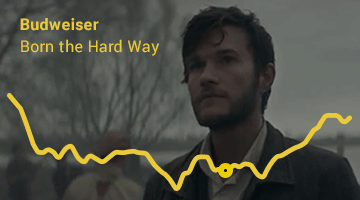
Play Your Audience Emotions to Stay On Top of The Game

Alex Browne
The average TV audience for Super Bowl LI was 111.5 million, peaking at a record 172 million. With those kind of numbers and with that high level of concentrated exposure that only comes once a year – a consensus has formed, that all Super Bowl commercials should have a wide appeal.
You might think that the archetypal Super Bowl ad – given the brimming machismo of the centerpiece event – would have a male bias. However, the Super Bowl audience is far more sophisticated and diverse than that. Women make up for at least 47 percent of the Super Bowl XLIX viewing audience and, importantly, make 85% percent of all household purchasing decisions. I mean, look at the halftime show, which over the last four years has been fronted by Lady Gaga, Beyoncé, Katy Perry and Bruno Mars! This is mainstream entertainment.
For content creators, creating a great commercial that has mass appeal is as hard as it sounds. Having a target audience can give a hook, a framework to work with. But it’s definitely possible, and our data shows that humor is often the key.
We measured the emotional responses of a gen pop US audience, watching 84 commercials (capturing facial expressions via webcam and automatically analysing emotions in real-time.) We found that the best emoters were by and large irreverent and humorous, and they had an emotional appeal that spanned demographics. Whether it was cheeky, laugh out loud humor, uplifting joy, wry amusement or the guffaw of schadenfreude; they all pushed the Happiness metric hard – for all ages and especially both genders.
Tied in pole position were Mr Clean and Skittles. You’d suspect each brand has a target demo, but this year they used humor to engage young and old, male and female alike. This was not the case for some other offerings – I’ve picked out three here. We’ll focus on gender, and picture what the brand might have done if they’d been privy to the data pre- Super Bowl:
We found that the best emoters were by and large irreverent and humorous, and they had an emotional appeal that spanned demographics...it landed far harder with women than men.
1. Hyundai – ‘A Better Super Bowl’
In emotional terms Hyundai had a good year, placing 12th in our list. A Better Super Bowl is a feel-good creative that takes square aim at the heart. It was the product of an extraordinary logistical exercise, where Hyundai facilitated a twist on a familiar tale – families surprising soldiers on deployment. It's not the well-worn 'soldier returning home to his kids/dogs story, but just as emotionally potent!
It's solid, heart-warming stuff, with a clear emotional trajectory. The ‘reveal’ – when families surprised the soldiers – is designed to elicit a strong Happy response. However, it landed far harder with Women than men. At the peaks, 35% of women were positively enaged, versus 18.9% of men.
Now this performance among women is truly exceptional, and clearly women are an important taregt for auto purchase, but not more so than men. Perhaps it would be wise not to leave them on their sidelines.
2. World of Tanks – ‘Real Awful Moms’
15 seconds of weird, shouty humor propelled World of Tanks into mid-table position. If we removed men from the sample, it would have scored just outside the top 20.
In this case it wasn’t a particular moment than polarized the audience. Women were consistently more engaged. It seems the cat-fight dynamic, played out by this all-female cast, resonated more with them.
You’d suspect World of Tanks’ target audience has a male skew. It’s great that they were able to make women smile, but in doing so did they jeopardize their appeal to men? So it would seem. A return to the drawing board perhaps?

Access to this data upfront may well have caused pause for thought.
In 2015, Budweiser’s Lost Puppy proved a massive hit among women. Unfortunately, their CMO confirmed that this was the ‘wrong audience’ - “while everybody loves the puppies, they have zero impact on category sales”
This year it reversed the pattern by trading a feel-good story for a gritty epic.
The Hard Way is a cinematically shot slow-burner. It’s dramatic rather than funny. It has caused a stir for focusing on the politically vogue subject of immigration, but in real time it turned in a disappointing emotional performance – 78th place.
However, it scored a 7 among Men (would have been 44th place) and a 4 with Women. Men were happier throughout.
Given the CMO’s statement, the simple fact that The Hard Way engages men better than women would not be unwelcome news. However, by Budweiser’s lofty advertising standards, 44th place among your target is not a resounding success. Access to this data upfront may well have caused pause for thought.
Conclusion
When you're putting your content before a massive, diverse audience, it's useful to be able to assess whether you're driving incremental value by appealing not only to those that buy but also to those that consume or use.
Clearly, in other scenarios, such audience audience emotional intelligence can inform targeting decisions. However, in the case of the Super Bowl, it also tells you whether your drawing disproportionately on a particular demographic for your emotional punch

